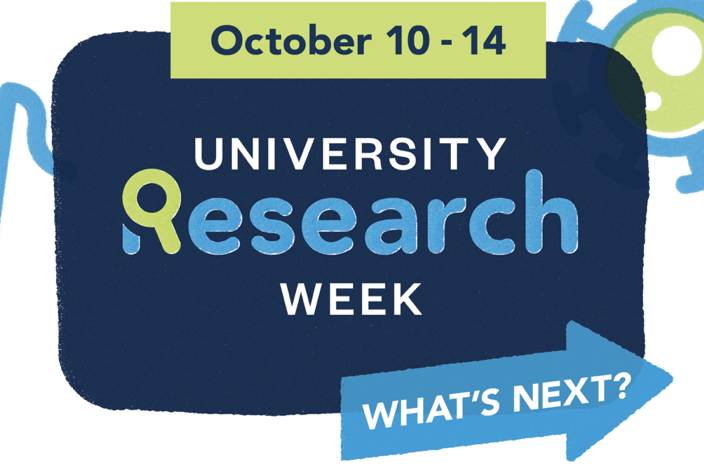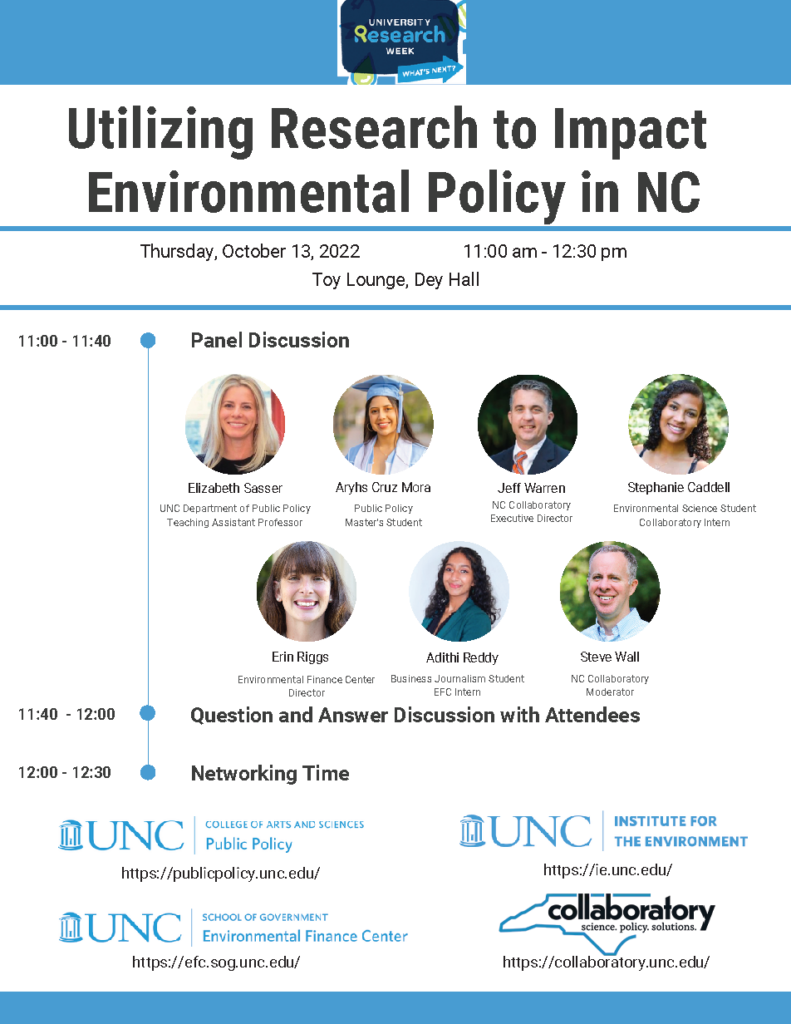Steve Wall is a policy research associate at the UNC Institute for the Environment and serves as the outreach director for the NC Collaboratory. Steve is a double Tar Heel (B.A. in Political Science ’93 and J.D. from the UNC School of Law ’97). During his twenty-year career working on environmental policy at the state and federal levels, Steve has held positions as a congressional aide, a lobbyist for an environmental advocacy organization, and a policy adviser for the NC state environmental agency. He’s been in his role at Carolina since 2014.
Editor’s Note: The topics discussed in this blog post will be showcased at a panel discussion during UNC-Chapel Hill’s (UNC) University Research Week. The panel is scheduled for Thursday, October 13, from 11:00 – 12:30 on UNC’s campus at Toy Lounge in Dey Hall. The event is open to faculty, staff, students and the general public. Register Here
Taking Time to Highlight Research
During the week of October 10 – 14, UNC-Chapel Hill (UNC) will celebrate University Research Week and call attention to the billion-dollar enterprise that research activities comprise across campus. As one of the top research universities in the country, everyday UNC faculty are making new discoveries and conducting cutting-edge research with an eye on the future and What’s Next?
Much of that research is advancing new knowledge and leading to publications in academic journals. More importantly, the research findings generated at UNC are increasingly being utilized to benefit citizens in all regions of North Carolina, such as the ground-breaking Carolina Across 100 project.
One specific example that illustrates that point quite clearly is in the field of environmental and natural resources. Over the past several years, UNC’s research focused on environmental issues has helped shape the policy-making process in Raleigh and assisted local governments throughout the state in making more informed decisions about managing environmental and public health programs.
In my role at Carolina, I focus on sharing and promoting the latest research findings and results with the public and with decision-makers within state government. While recently explaining my job to my 16-year-old daughter, she summarized my work as this: “so basically you just talk about all the cool environmental stuff other people are doing.” While there is some truth to that statement, the job does give me a front-row seat to some of the most impactful research taking place on campus, including topics such as:
- Evaluating the potential for compound flooding in eastern NC storm events and mitigating potential harm to residents;
- Developing a comprehensive plan to catalyze the state’s aquaculture industry, which the legislature used to develop new funding and policy programs; and
- Working to better understand how PFAS, “forever chemicals,” are affecting the drinking water and public health in Fayetteville, Wilmington and other areas of the state.
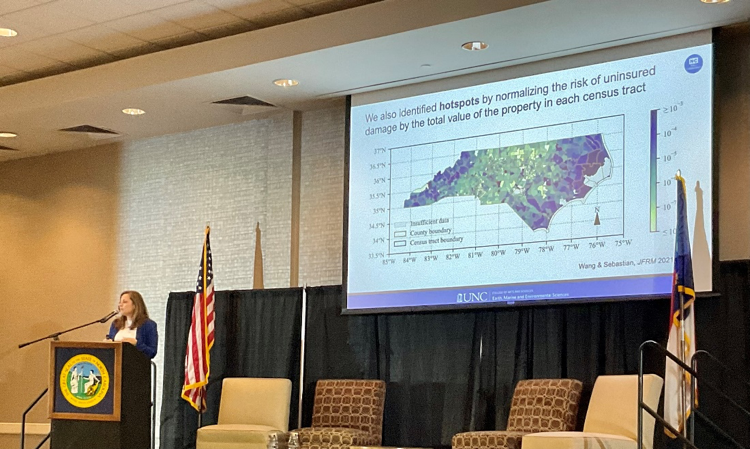
I am fortunate to work at units at Carolina whose leadership (Mike Piehler with the Institute for the Environment and Jeff Warren with the NC Collaboratory) is committed to the idea that university research can impact management decisions by the state legislature and at state agencies across the executive branch. Both leaders have set high standards to ensure that research projects are academically rigorous, while also providing practical value that can be applied to informing decisions by state and local officials.
The Power of Partnerships
One of the most influential people in my career was my former boss, Bill Ross, who served as the head of the North Carolina Department of Environmental and Natural Resources (DENR) from 2001 to 2009. Bill is a long-time environmental attorney whose impact on environmental programs and land conservation projects across North Carolina is immeasurable. During his tenure as Secretary of DENR, Bill frequently emphasized that to make progress on environmental challenges there is a need for collaboration and there is value in developing non-traditional partnerships.
The environmental research taking place at Carolina is a testament to the idea that partnerships provide additional value and are critical to identifying real-world solutions. One specific example worth noting is the multi-year UNC Jordan and Falls Lakes Study, which began in 2016 at the direction of the legislature.
Over the course of the study, a multi-disciplinary team of university researchers has been evaluating how to address the nutrient pollution issues that have plagued Jordan and Falls Lakes for decades. Both reservoirs are critical drinking water sources for the Triangle and a key element of continued economic growth for the region.
Faculty, staff, and graduate and undergraduate students from UNC-Chapel Hill, NC State, and East Carolina working on this study have all played a role in identifying the causes of water quality concerns in the reservoirs and potential mitigation measures. Through increased monitoring and data gathering, the researchers have begun to fill in critical information gaps. While these universities’ sports teams may be rivals in athletics, their research teams are working together in partnership on this study.
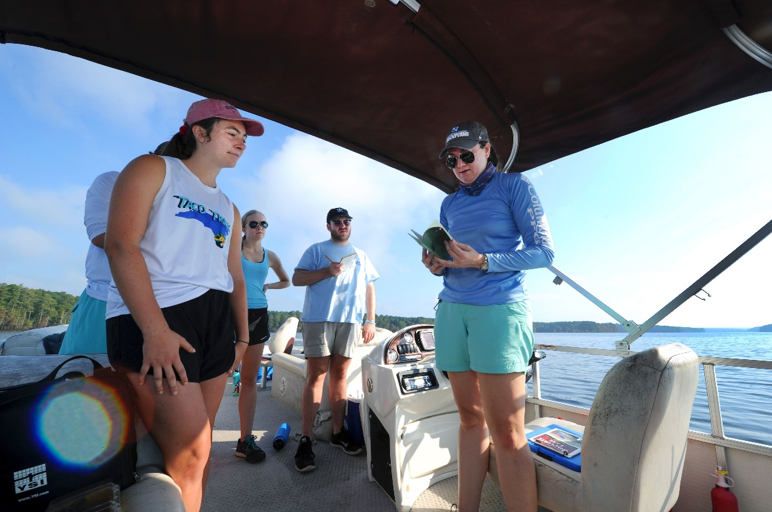
One specific component of the study has gotten attention for its innovative approach to identifying funding mechanisms that could increase the amount of revenues needed for water quality improvements in the watersheds. This piece of the study is led by Erin Riggs, the director of the UNC Environmental Finance Center (EFC). Part of EFC’s work on the study has included semester-long capstone classes with undergraduate students conducting research in support of the study.
Another aspect of the study that emphasizes partnerships is evidenced in the design of the research questions themselves. The research questions guiding the study have been influenced by a number of interested parties in the Jordan and Falls Lake watersheds. Consequently, these stakeholders have become partners in the study in a sense. While local governments throughout the watershed have a large voice, others such as the agricultural community, environmental non-profits, and the development sector have all been involved in helping identify what types of research can provide the information needed to support sound management decisions of Jordan and Falls Lakes in coming years and decades.
Importantly, it should not go unsaid that the collaboration between the North Carolina General Assembly and the university underlies a significant portion of the ongoing research focused on addressing some of the state’s most pressing environmental challenges. The state legislature, in partnership with university leadership, including several key members of the UNC Board of Trustees, has worked to cultivate this growing focus on environmental research.
Supporting the Next Generation of Environmental Leaders
One noteworthy outcome of this influx of new environmental research is that it has provided experiences for hundreds of undergraduate and graduate students to work on environmental projects. Students get to see first-hand the many factors that influence management decisions and gain a better understanding of how scientific findings are considered during the policy process.
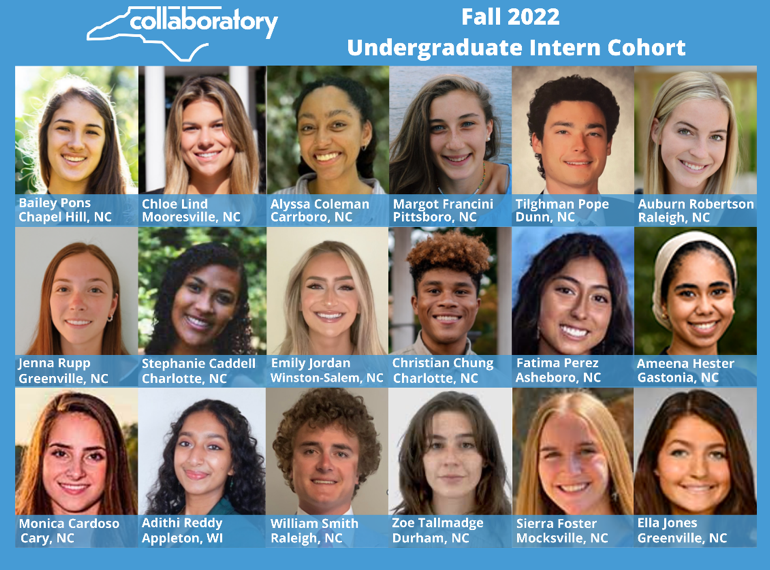
The university is providing a wide range of opportunities for students to develop skills that will help launch their careers in the environmental field. While not a fully comprehensive list, several examples of these programs are making a significant impact in connecting students to careers, including:
- Internships, managed by the Institute for the Environment, place students with non-profits, private sector companies, and governmental agencies through the Molchanov Scholars and EcoStudio
- The Department of Public Policy’s innovative dual degree program allows students to complete a Master’s degree with one additional academic year.
- The annual UNC Clean Tech Summit provides a forum for students to learn about the latest energy topics and connects them with a wide range of companies in the energy space from start-ups to major utility companies.
- The NC Collaboratory’s student staff program created at the behest of its Advisory Board has grown from three student interns in 2019 to a student staff of eighteen undergraduates during the 2022 fall semester.
As a result of these opportunities afforded students at the undergraduate and graduate level, recent UNC alumni are working in a variety of positions with organizations such as, the U.S. Environmental Protection Agency, the National Park Service, national consulting firms, leading solar companies, conservation non-profits, and a myriad of state and local governmental agencies.
Celebrating Undergraduate Research
For those of us working in the environmental research space, it is both exciting and rewarding to see this topic highlighted during Carolina’s University Research Week. One specific example of that showcase is the selection of Professor Orlando Coronell, a faculty member at the Gillings School of Global Public Health, and Collaboratory undergraduate intern, Christian Chung, to help keynote University Day on October 12. Orlando and Christian will present the latest findings on the novel technology developed here in labs on campus that is designed to remove PFAS from drinking water.
This research caught the attention of the General Assembly, which just last year provided $10 million dollars in funding to scale the project up with the intention of testing it in communities impacted by PFAS pollution in North Carolina.
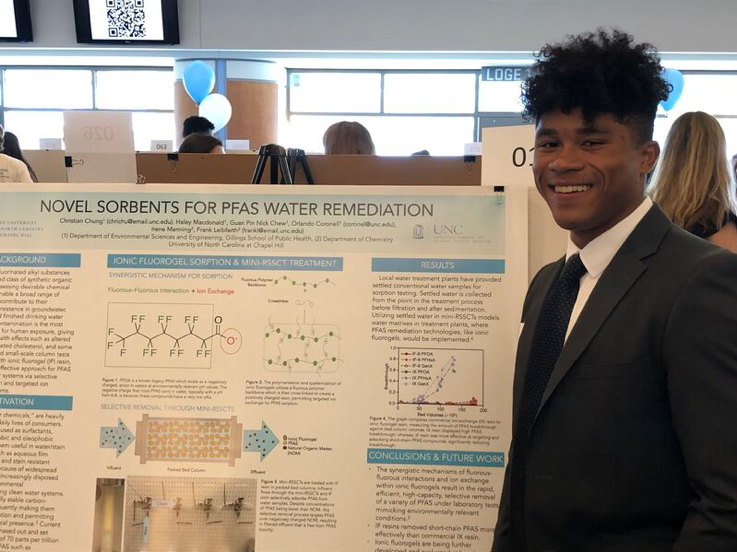
To further highlight the many active research projects on a wide range of environmental issues, several UNC units are jointly hosting a panel titled: Utilizing Research to Impact Environmental Policy in North Carolina. The panel will feature environmental leaders on campus, and consistent with the theme of University Research Week, will also include undergraduate and graduate students discussing their involvement with research. Students are encouraged to attend and can register here: https://unc.live/3Do3jeN
Students interested in learning more about how to get involved with environmental policy can contact Steve at swall@email.unc.edu or connect with him on LinkedIn https://www.linkedin.com/in/steve-wall-1b826a86/


